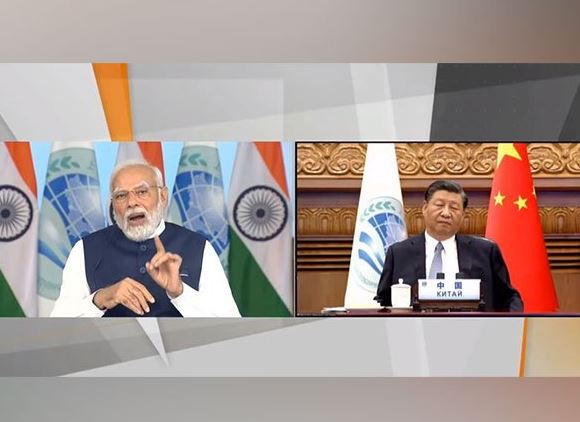New Delhi: India Tuesday once again refused to endorse China’s ambitious Belt and Road Initiative (BRI), becoming the only country in the Shanghai Cooperation Organisation (SCO) not to support the project.
A declaration issued at the end of an India-hosted virtual summit of the grouping said Russia, Pakistan, Kazakhstan, Kyrgyzstan, Tajikistan and Uzbekistan reaffirmed their support to the BRI.
It said the member states also considered it important to ensure the implementation of the SCO Economic Development Strategy 2030 adopted by “interested member states” and projects aimed at promoting cooperation in areas of digital economy, high technology and modernisation of existing international routes for road and rail transport.
In his opening remarks at the summit, Prime Minister Narendra Modi highlighted the need for boosting connectivity, but asserted that it is essential to respect the basic principles of the SCO charter, especially the sovereignty and territorial integrity of member states, while making such efforts.
The summit, chaired by Modi, was joined by Chinese President Xi Jinping, his Russian counterpart Vladimir Putin, Pakistan Prime Minister Shehbaz Sharif and other leaders of the grouping.
“Strong connectivity is crucial for the progress of any region. Better connectivity not only enhances mutual trade but also fosters mutual trust,” he said.
“However, in these efforts, it is essential to uphold the basic principles of the SCO charter, particularly respecting the sovereignty and regional integrity of the member states,” Modi said.
On earlier occasions also, India did not endorse the BRI at the SCO while other members supported the project.
“Reaffirming their support for China’s ‘Belt and Road Initiative’ (BRI) initiative, the Republic of Kazakhstan, Kyrgyz Republic, Islamic Republic of Pakistan, Russian Federation, Republic of Tajikistan and Republic of Uzbekistan note the ongoing work to jointly implement this project, including efforts to link the construction of the Eurasian Economic Union and BRI,” the New Delhi declaration said.
“They spoke in favour of implementing the Roadmap for gradual increase in the share of national currencies in mutual settlements by the interested member States,” it added.
It said the member states intend to broaden and deepen cooperation for sustainable socio-economic development and to improve the well-being and living standards of the people in the SCO region.
“They consider it important to ensure the implementation of the SCO Economic Development Strategy 2030 adopted by interested member states, other joint programmes and projects aimed at promoting cooperation,” it said.
The priority areas identified under the Economic Development Strategy are as digital economy, high technology and innovation, modernisation of existing international routes for road and rail transport, multimodal transport corridors and logistics centres, finance and investment, energy and food security, reliable, resilient and diversified supply chains and industrial cooperation.
On Afghanistan, the declaration said the member states believed that one of the most important factors of preservation and strengthening of safety and stability within the SCO region is the “early settlement” of the situation in Afghanistan.
“They advocate building Afghanistan as an independent, neutral, united, democratic and peaceful state, free from terrorism, war and drugs,” it said.
PTI
